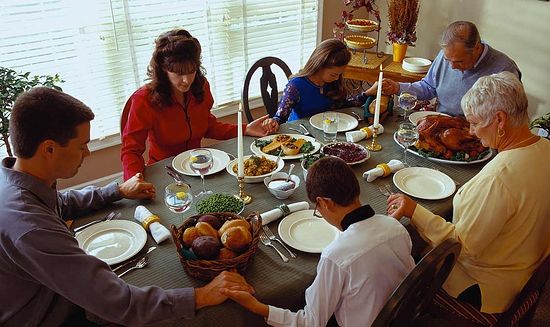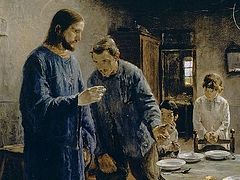Source: Raising Saints
November 22, 2015
Thanksgiving is just around the corner. This is such a beautiful holiday — all the more so because it’s so rare for just about everyone in the United States to stop moving, gather together with family and loved ones, and express gratitude to our Creator.
In recent decades, our nation has begun to struggle against sharing religious experiences; freedomof religion is being reshaped into freedom from religion; prayer in public spaces is becoming less and less acceptable to a public that demands that your religious expressions and beliefs be hidden away in your closet. Somehow, people are finding ways to be offended by Christian beliefs and expressions, and their right not to be offended is beginning to overrule our rights to live out our life in Christ as we must.
It is a wonder that in the midst of this strange cultural revolution, Thanksgiving stands untouched. No one seems to mind that we have a national holiday that calls for us all to go home and say thank you to the Deity that blessed us with food and family and love.
What a beautiful holiday.
As long as there’s Thanksgiving, surely there’s hope for America!
Indeed, America could benefit from more time spent being grateful for blessings that we cannot deserve. Our culture has become one of entitlement — we tend to think that we’ve earned our blessings, that we deserve every one of them.
This is a struggle that our kids will face, especially this generation.
I don’t know if you’ve tried to play Musical Chairs at a birthday party lately, but I have and it was really strange. The music stopped, and one kid didn’t have a chair — that’s how the game works; it’s a process of eliminating kids who don’t win — the losers — one at a time, until only one kid remains, the winner. Guess what? As the kids were eliminated, one by one, they burst into tears. Not just sad tears, but tantrum tears. The same thing happened when our parish held a cake walk. The kids could not wrap their minds around the idea that only one winner would receive a cake. They live in a world where no one keeps score at soccer games and everyone who plays gets a trophy. We’re setting up our kids to expect to win everything.
Rather than teaching children to handle life’s vicissitudes, we protect them. In the end, we are producing children who feel entitled to a prize just for showing up.
How will these children ever feel grateful for the simple blessings of life? One who is entitled to clean air and healthy food and a good job and several trophies does not celebrate those blessings when they come — rather, they curse the unfairness whenever the blessings don’t appear. That kind of attitude makes for an unhappy life — and it has serious spiritual consequences.
One of the great blessings of the fast is that it makes us grateful for little things. I love how when I pour myself a cup of coffee in the morning, when I go to add cream, I must ask myself if it’s allowed today. I look for permission, and I celebrate the creaminess of my coffee on Tuesday, because Wednesday’s coffee won’t be as good.
We should be grateful for the blessings of a feast, for the meat and the cheese that don’t have to be there. We should be grateful for all of the little pleasures, and even more so for the big items — another morning, good enough health, family and parish, God’s great mercy.
How do we teach our children gratitude — not just occasional gratitude, around the table at Thanksgiving dinner — but how can we impart a living gratitude that permeates their every moment?
Well, fasting helps. We are grateful for things when we’ve spent some time without them. The released prisoner is grateful for freedom, and the man who almost starved is grateful for food. Fasting helps us to be grateful for the earth’s bounty, for the meats and and fish and dairy products that give our diet variety and flavor.
If your household isn’t fasting, then you’re missing out on this.
In the parishes, we need to be making our kids aware of the fasts, so that they will bring them home and so that, when they establish their own households, they will keep this holy tradition that nurtures gratitude in each of us.
There’s a good reason that holy tradition would nurture gratitude; for as St. Paul teaches us, the condition of gratitude invites the Holy Spirit:
Be anxious for nothing, but in everything by prayer and supplication, with thanksgiving, let your requests be made known to God; and the peace of God, which surpasses all understanding, will guard your hearts and minds through Christ Jesus. Finally, brethren, whatever things are true, whatever things are noble, whatever things are just, whatever things are pure, whatever things are lovely, whatever things are of good report, if there is any virtue and if there is anything praiseworthy—meditate on these things. The things which you learned and received and heard and saw in me, these do, and the God of peace will be with you. (Phillipians 4:6-9)
We can thankful for scripture like this, which teaches us how gratitude will pave the way for the peace of God, the God of peace.
Paul tells us to take our anxieties to God, to offer up those worries and concerns in prayer and supplication, but he adds something that we might easily miss: “with thanksgiving, let your requests be made known to God”. In those dark, anxious times, when we are worried and hurting and needful, we must accompany our requests with thanksgiving!
We may tell our kids to take their worries to God, but have we told them that they should be presenting those anxieties and struggles with thanksgiving?
That doesn’t come naturally, does it? When we are worried — whether it’s about our health or a loved one, or an upcoming science test or a lost friendship, we tend to focus on our concerns and our fears. We let the anxiety run loose, and we focus our minds and hearts on everything we stand to lose.
But Paul tells us that we must bring these requests to God with thanksgiving. We must make the effort to shift our focus to the blessings we have already received, which will prepare us to receive “the peace of God, which surpasses all understanding, [which] will guard [our] hearts and minds through Christ Jesus.”
That doesn’t come naturally; it’s an effort. Fortunately for us, Paul is very clear in his instruction —
[…] whatever things are true, whatever things are noble, whatever things are just, whatever things are pure, whatever things are lovely, whatever things are of good report, if there is any virtue and if there is anything praiseworthy—meditate on these things. (Phillipians 4:8)
In the midst of anxiety, we are to seek out those things which are true, noble, just, pure, lovely, of good report, anything of virtue, anything that is praiseworthy. We are to find the bright spots, and meditate on those. We must bring them to God right alongside our complaints and our fears.
This verse brings to mind St. Paisios’ image of the garden, where we must choose to either be flies who look for dirt and dung, or bees, who seek the flowers and the sweetness. He says that we are all either flies or bees.
Paul’s instruction is clear: we must live as bees, hunting out that which is good and sweet for meditation. This is what will open us to the peace of God; through the thanksgiving, the gratitude, our hearts will be ready to receive Christ’s peace.
This is an important verse to teach our kids, especially those adolescents who are so prone to depression and anxiety. Gratitude is like a spiritual antidote; it’s our first line of defense.
So Thanksgiving is no small thing.
The ability to be truly grateful is necessary to live in God’s peace. It is a blessing that this nation takes a day to be thankful, and it is appropriate that we take it just before we embark on a ridiculous season of shopping and excess. Just before the children make their Christmas wish lists and lose themselves in the material passions that are stirred up by advertisers hawking toys and gadgets, American children are invited to the Thanksgiving table, to take one day to be grateful for the blessings they already have.
It is a common tradition at many Thanksgiving tables, to go around the table, each person saying what they’re thankful for on this day. This is a good custom, and it’s one that we as Orthodox Christians, who understand the integral role that gratitude plays in the spiritual life, must embrace every day.
How about if we sit around the Sunday School table, or before a meal at your next youth event, or in your family home, and practice this thanksgiving out loud. Why not make this part of our evening prayers? We can take this custom and really baptize it, making it wholly useful to the Orthodox Way.
Rather than just say, “I am thankful for my mom”, let’s say, “I thank You, Lord, for my mom.” It’s important that we’re not just stating our gratitude, but that we’re addressing that gratitude to God!
Doing this once a year is nice. But doing this every day would really help our kids learn to see the world like bees see a garden: they’ll survey the scene identifying each flower, each thing that is true or noble or good. By asking them every day to express gratitude to God for something, we’ll train them to be on the lookout for blessings at all times.
There are many ways to reinforce gratitude in children: from fasting, to serving our unfortunate neighbors in soup kitchens and homeless shelters, to the simple act of writing thank you cards to acknowledge another’s efforts to make their lives more pleasant.
But the most important and most effective means of teaching gratitude, is showing gratitude ourselves. Let all of us, the teachers and the youth directors, the parents, grandparents and godparents, let all of us lead our children by example, meditating on all that is good and pure, even in the midst of strife and struggle. Let us thank God openly, and let us thank each other and thank our kids when they do good, keeping gratitude on our tongues.
In this small but hugely important way, by living our thanksgiving to God, we will teach our children how to protect themselves from anxieties and we’ll innoculate them against this insidious culture of entitlement that surrounds them. Most importantly, we’ll prepare our hearts to receive the peace of God which surpasses all understanding.
May all of you have a beautiful Thanksgiving, on this upcoming holiday and every day.




